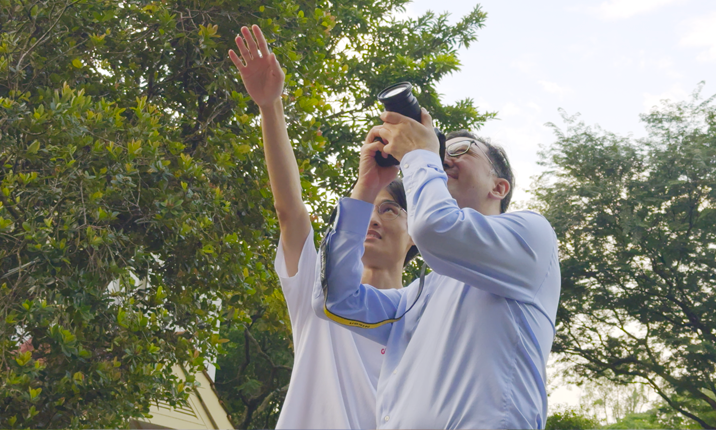

How Deep Brain Stimulation Helped Samuel Manage Tourette’s
Last updated: Friday, September 26, 2025 | 5 min reading time
Photographer Samuel Lim has lived with Tourette syndrome for 19 years, which at one point made holding a cup — let alone a camera — difficult. Thanks to deep brain stimulation surgery, he’s back to chasing his dreams with renewed confidence.
At 25, freelance photographer and student Samuel Lim has lived with Tourette syndrome for nearly two decades. This neurological condition is marked by sudden, involuntary and repetitive movements or sounds, known as tics.
An often-misunderstood condition, Tourette’s has been brought into the spotlight in recent years by public figures like Billie Eilish and Lewis Capaldi, who have shared their own experiences of living with it.
Diagnosed at six, Samuel’s condition worsened during his teenage years, making it increasingly difficult to focus on his studies and pursue photography, which had become central to his life. “When I first developed Tourette’s it was quite mild, but unfortunately, when I reached the age of 16, it got a lot worse,” Samuel recalls. “It started off by me being unable to sit for exams, and then slowly progressed to being unable to participate in daily activities. At my worst, it was difficult for me to even hold a cup of water.”
Struggles and stigma
The worsening tics took a toll on Samuel's confidence. In 2016, at the height of his symptoms, he faced bullying at school and became depressed. “There were periods when I felt alone, inferior and helpless," he says.
Tired of hiding, Samuel made a bold decision in 2017 during his first year at polytechnic. He stopped suppressing his tics and created an Instagram account called ‘touretteshoots’. Photography became his lifeline and a way to rebuild confidence and express himself.
But even as his creative work flourished, Tourette's began stealing it away. "I was freelancing, doing photography and videography, and it reached a point where I wasn't able to hold the camera properly or even step out of the house," he says.
The condition eventually derailed his education entirely. At 19, Samuel had to drop out of school.
Samuel tried everything he could: conventional medication, alternative therapies, and even cognitive behavioural therapy (CBT). “Those helped to a certain extent, but the effect was quite marginal,” he explains.
By late 2023, after yet another hospitalisation, he realised he had reached a crossroads. “That was a very tough period for my family, and it was the point when we began exploring deep brain stimulation (DBS) as a possible treatment to better manage my condition,” he shares. It was then that he was referred to Dr Nicolas Kon, neurosurgeon at Mount Elizabeth Hospital.
Understanding Tourette’s
Dr Kon explains that Tourette syndrome is a neurodevelopmental condition.
“It develops in childhood, and the presenting symptoms are usually either motor or vocal tics,” he says. “With motor tics, people have abnormal movements in the face or body, and with vocal tics they produce sounds such as grunting. For many, symptoms improve in adolescence, but for some patients, they persist.”
“Tourette’s may cause a lot of stigma for children suffering from it, as well as their families, as people assume it is a result of bad parenting or psychological problems. But it is in fact a disorder of the brain circuitry,” he emphasises.
The road to deep brain stimulation surgery
“When I first met Samuel, he struck me as a very intelligent, creative young man with a strong passion for photography,” recalls Dr Nicolas Kon. “Before our consultation, I even looked up his Instagram and was impressed by the beautiful photos he had taken. One of the dreams he shared was to travel and take photos outside of Singapore, but he couldn’t, because of his Tourette’s.”
Samuel attended the consultation with his parents. Together, they reviewed his symptoms, how the tics were affecting his life, and the treatments he had already tried. “It was clear he was no longer responding to conventional options,” says Dr Kon. “He met all the criteria for deep brain stimulation.”
Dr Kon explains that deep brain stimulation (DBS) involves implanting a small device in the body, connected to fine wires placed in specific brain regions. “Essentially, it’s a pacemaker for the brain,” he says. “In Samuel’s case, we targeted the globus pallidus, one of the areas generating abnormal signals. The wires deliver small electrical impulses that regulate these signals.”
As DBS surgery is not considered a standard treatment for Tourette’s in Singapore, the case needs to go through the Health Ministry’s Clinical Ethics Committee (CEC) for review. Samuel received approval to proceed with the procedure. “I’m very grateful to Dr Kon and his team. They gave me a detailed rundown of how the process was going to be and were with me every step of the way,” he says.
Life after deep brain stimulation surgery
Dr Kon has been following Samuel’s progress closely since his surgery in 2024, building a strong rapport along the way.
“He’s the kind of patient every doctor dreams of having," says Dr Kon. " Despite living with severe Tourette’s his whole life, Sam showed remarkable determination not to let the illness bring him down. He was ready to face it head-on, and I wanted to support him in that journey.”
Since the procedure, Samuel’s tics have reduced significantly, giving him the freedom to regain control of his life.
“My life has definitely changed for the better,” Samuel shares. “I can now pursue my goals and dreams without the fear of being held back by an uncontrollable condition. There are still days where my tics are more visible, like when I am stressed, but compared to pre-surgery the difference is night and day.”
Samuel has since re-enrolled in Singapore Management University, a milestone that once seemed out of reach. He joined his school’s investment club and even flew to Hong Kong to visit financial institutions. “I could do all these things without worrying that my tics would stop me. That was surreal,” he says.
He has also returned to his first love — photography. “I’ve done both passion projects and paid projects. The general response I get when I tell people I have Tourette’s is, ‘Oh, I didn’t notice.’ Honestly, I was taken aback, but also really happy to hear that,” he recalls.
Sports, too, have become part of his life again. “I started playing badminton again, and recently I even picked up Muay Thai,” he adds with a smile.
As for what's to come, Samuel says, “I’m focused on completing my degree, but I won’t give up photography. I love making friends with the people I photograph, and I am excited to keep exploring new things. After all, the world is your oyster, right?”
From uncontrollable tics to regained independence
Samuel’s story shows that Tourette’s — which he once experienced as uncontrollable — can be managed with the right care. For individuals with severe tics that do not respond to medication or cognitive behavioural therapy, deep brain stimulation (DBS) may offer hope, helping to ease symptoms and restore independence.
Mount Elizabeth Brain & Spine Care: Possible Starts Today
When it comes to your brain and nervous system, even small symptoms can feel overwhelming. At Mount Elizabeth Hospital, you don’t have to navigate them alone. Our experienced neurosurgeons are here to listen, assess, and guide you towards the right care — helping you take control of your health with confidence.
Find a specialist Brain & Spine Care
Brain & Spine Care








